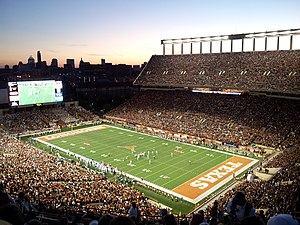Darrell K. Royal-Texas Memorial Stadium
| "DKR" | |
 |
|
| Former names | War Memorial Stadium (1924–47) Memorial Stadium (1948–76) Texas Memorial Stadium (1977–95) |
|---|---|
| Location | 405 East 23rd Street Austin, TX 78712 |
| Coordinates | 30°17′1″N 97°43′57″W / 30.28361°N 97.73250°WCoordinates: 30°17′1″N 97°43′57″W / 30.28361°N 97.73250°W |
| Owner | University of Texas System |
| Operator | University of Texas at Austin |
| Capacity | 100,119 (2009–present) |
| Record attendance | 102,315 vs The University of Notre Dame on 9/4/2016 |
| Surface |
FieldTurf (2009–present) Natural grass (1996–2008) Artificial turf (1969–1995) Natural grass (1924–1968) |
| Construction | |
| Broke ground | 1924 |
| Opened | November 8, 1924 (first game) November 27, 1924 (dedication) |
| Renovated | 1955, 1977, 1986, 1996, 2002, 2005, 2011, 2013 |
| Expanded | 1926, 1948, 1964, 1968, 1971, 1997–1999, 2006–2009 |
| Construction cost |
$275,000 ($3.84 million in 2016 dollars) |
| Architect | Herbert M. Greene |
| General contractor | Walsh and Burney |
| Tenants | |
| Texas Longhorns (NCAA) (1924–present) | |
Darrell K Royal–Texas Memorial Stadium (formerly War Memorial Stadium, Memorial Stadium, and Texas Memorial Stadium), located in Austin, Texas, has been home to the University of Texas at Austin Longhorns football team since 1924. The stadium has delivered a great home field advantage with the team's home record through the 2015 season being 362–108–10 (76.5%). The current official stadium seating capacity of 100,119 makes the stadium the second largest stadium in the state of Texas (behind Kyle Field), the largest in the Big 12 Conference, the eighth largest stadium in the United States, and the ninth largest stadium in the world.
The DKR–Texas Memorial Stadium attendance record of 102,315 spectators was set on September 4, 2016, when unranked Texas played #10 The University of Notre Dame and won in double overtime, 50-47
The stadium has been expanded several times since its original opening. The University's most recent completed project was a $27 million expansion and renovation project to the south end zone facilities in August 2009. For the 2009 season, 4,525 permanent bleacher seats were constructed, which allowed the stadium to become the first football stadium in Texas capable of seating in excess of 100,000 people and brought the stadium to its current seating capacity. In May 2013, Regents for the University of Texas system approved a $62 million stadium improvement project. This project will improve and add athletic and academic facilities within the existing stadium structure, but it will not expand the current seating capacity. The timeline for this project's completion has not yet been revealed.
In 1923, former UT athletics director L. Theo Bellmont (the west side of the stadium is named in his honor), along with 30 student leaders, presented the idea of building a concrete stadium to replace the wooden bleachers of Clark Field to the Board of Regents. Heralded as "the largest sports facility of its kind in the Southwest" upon its completion in 1924, the first unit of the stadium consisted of the east and west stands with a seating capacity of 27,000. It was designed as a dual-purpose facility with a 440-yard (400 m) track surrounding the football field. The stadium was financed through donations from both students and alumni. The estimated cost of the structure was $275,000.
...
Wikipedia
